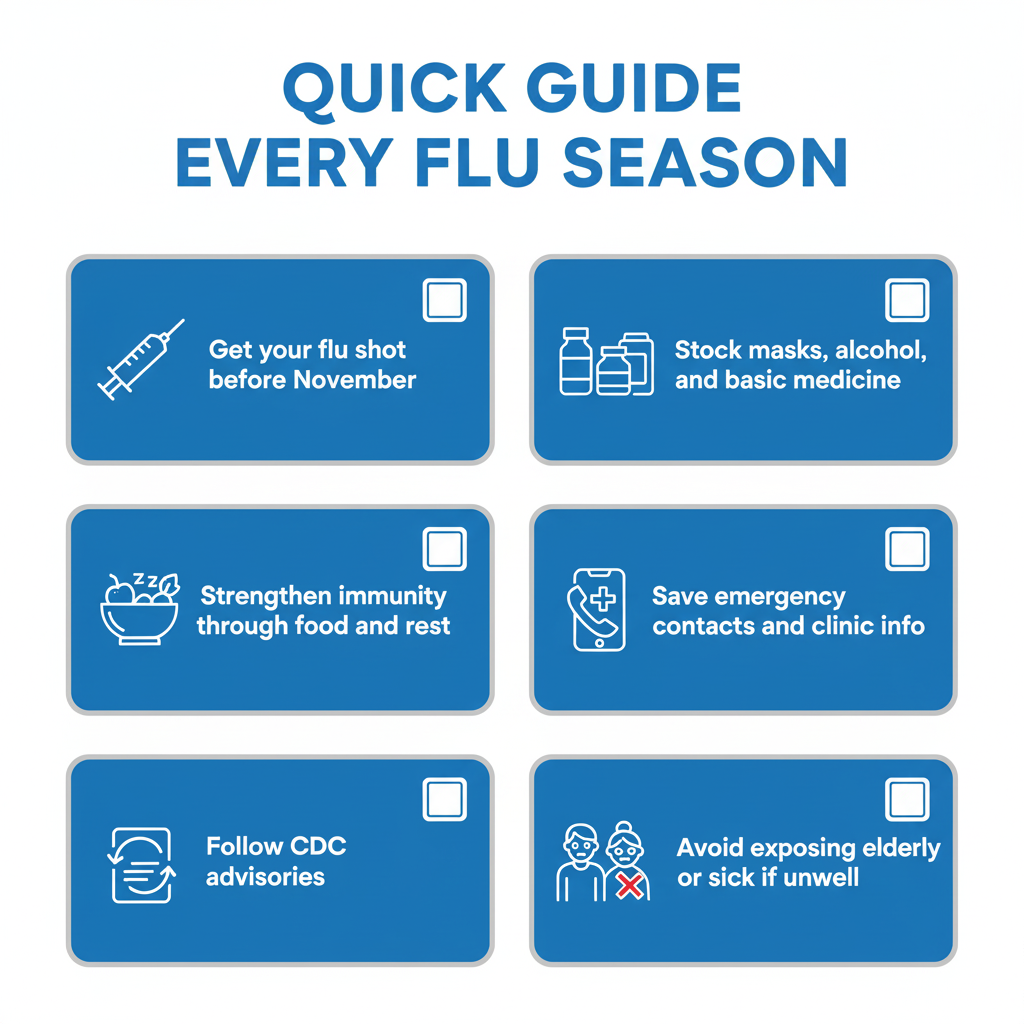The first winter I spent in Taiwan, half of our dorm caught the flu in just one week. It started with a mild cough, then suddenly, many of us were too weak to work or even get out of bed. That was when I learned how serious Taiwan’s influenza season can be, especially for OFWs living in shared rooms and tight schedules. Taiwan flu season runs from November to March, and protecting ourselves is not just a personal choice but a responsibility to those around us.
One night I overheard a co-worker say, “May flu outbreak daw sa dorm sa kabila. Ingat kayo, ha?” That was my wake-up call. Being sick as an OFW is different. When we fall ill, we don’t only worry about our health. We worry about our job, our employer, our income, and our family back home. That is why preparation matters. In Taiwan, the flu spreads fast during winter and peaks around Lunar New Year when travel and gatherings are at their highest.
As OFWs, we work in factories, hospitals, dormitories, and private homes. We care for patients, children, and the elderly. We serve customers face-to-face. We ride crowded trains and live in shared spaces. This makes influenza a real threat. Taiwan CDC data shows that while most flu cases recover in one to two weeks, severe infections can lead to hospitalization. For high-risk groups—children, older adults, pregnant women, and people with chronic illnesses—the risk is much higher.
But here is the good news: we are not helpless. With awareness, vaccination, good hygiene, and strong immunity, we can protect ourselves and the people who depend on us, both here and back home.

Why Taiwan’s Flu Season Hits OFWs Hard
Flu season anywhere can be difficult, but in Taiwan, three factors make OFWs more vulnerable:
| Factor | Why It Matters |
| Shared living spaces | Dorms and staff housing make viruses spread faster |
| Cold winter climate | Lower temperatures weaken immunity and prolong virus survival |
| Close-contact jobs | Caregivers, service workers, and factory teams work within tight spaces |
When one person in a dorm gets sick, it often spreads to others. In caregiving and health-related jobs, we are in contact with older adults who are most at risk. And in factories, one flu outbreak can affect entire production lines.
Vaccination: Your First and Strongest Shield
Taiwan CDC recommends the annual influenza vaccine, especially for frontline and caregiving roles. Flu strains change every year, so last year’s protection may not work this year. That is why vaccination is yearly.
Best timing:
- Get vaccinated before November for full protection by peak season.
Where to get the flu shot:
- Local health centers (衛生所)
- Hospitals and clinics
- Employer or broker-arranged vaccination days
Cost:
- Many high-risk groups receive free vaccination, including caregivers and those working with the elderly or children. Even if you are not qualified for free vaccination, the flu shot in Taiwan is still affordable and widely available.
Vaccination does not guarantee you will never get sick, but it greatly reduces severity, hospitalization, and complications. It is a small step that makes a huge difference.
What the Taiwan Government Provides: Flu-Season Support for OFWs
As an OFW in Taiwan, you’re not entirely on your own when it comes to influenza season. The Taiwanese government offers several key provisions that you should know about and make use of.
- Free or Subsidized Flu Vaccines
Every year, the Taiwan Centers for Disease Control (Taiwan CDC) rolls out a publicly funded vaccination program. For example, beginning October 1, 2025, Taiwan began administering free influenza (and COVID-19) vaccines in hospitals and health facilities across the country.
- The program is split into phases: in Phase 1, high-risk groups (older adults, children, those with chronic diseases, caregivers, long-term care staff) are eligible.
- Free vaccination is available at around 4,000 contracted clinics and hospitals throughout Taiwan.
- Some local governments have even extended free flu vaccines to migrant workers, foreign students, and foreign residents. In one city in Taiwan, foreign workers and students could receive free vaccines when they showed their residence permit.
Action tip for you: Check with your employer, local health center (衛生所) or dormitory admin about the free flu vaccine schedule for this year. Ask: “Am I eligible under the public vaccination program? When can I get it free?”
- Easy Access & Clear Guidance
The CDC website and hotlines provide clear instructions on where and how to get vaccinated. For example, eligible individuals can check local health bureau websites or call the 1922 communicable-disease hotline.
This means: you don’t need to guess where to go. Use official sources.
- Regular Outbreak Monitoring & Alerts
The government keeps a close watch on influenza spread, especially because the flu season runs from around November through March and peaks during Lunar New Year when travel and gathering increase.
This monitoring means that when cases rise, public health alerts follow — you will receive notices from your dorm, factory, or employer, or see official messages. That helps you act early.
- Special Measures for Migrant Workers and Foreign Residents
Though specific programs vary by region and employer, there are signs that foreign workers (including caregivers) are being included in health-care catch-up programs. As mentioned above, free flu vaccine access was extended in some locations to foreign workers and foreign students.
If you are working as a caregiver, factory worker, or service worker, ask your broker or employer whether you qualify for the free vaccine under your region. Also, enrolment in Taiwan’s national health insurance may make access easier.
Why This Matters for You
As an OFW you juggle many roles: worker, provider, caregiver. If you fall ill during flu season, you risk: loss of income, inability to care for someone else, extra stress. These government supports remove some barriers: cost, access, information.
When you take advantage of the free vaccine and monitoring systems, you are not only protecting your health — you’re safeguarding your job, your finances, and the household you support.
Quick Cheat Sheet: Government-Support Steps for OFWs
- Ask your employer or broker: “Where is the nearest contracted health centre for the free flu shot this year?”
- Bring your Alien Resident Certificate (ARC) or work permit when going for the vaccine (some local programs require proof).
- Keep a record: Date of vaccination, clinic name, any side effects — so you can refer to it if your employer asks.
- Subscribe or follow your local health center’s social media or LINE account of Taiwan CDC for outbreak alerts.
- If your region is not offering free flu shots to all foreign workers, ask about subsidized options — sometimes cost is minimal and clinic waiting is manageable.
Daily Protection Habits That Work in Taiwan
Taiwan has a culture of hygiene and disease prevention. Even before the pandemic, mask-wearing was common. As OFWs, we benefit from adopting these habits:
| Habit | Why It Helps |
| Wearing a mask in crowded places | Blocks droplets and reduces spread |
| Frequent handwashing | Stops virus transmission from surfaces |
| Using alcohol or sanitizer | Easy protection when on the go |
| Covering coughs and sneezes | Prevents infecting others |
| Avoiding crowds during outbreaks | Lowers exposure risk |
These small habits, when done consistently, create strong defense.
Boosting Immunity: Practical OFW Tips for Winter
Of all seasons, winter is when we must take extra care. Cold air dries our throat and nose, making it easier for viruses to enter. With long work hours and homesickness, our immune system can weaken further.
Here are OFW-friendly ways to stay strong:
| Focus Area | What to Do |
| Diet | Add guava, kiwi, oranges, and vegetables rich in Vitamin C |
| Hydration | Drink water even when it is cold and you don’t feel thirsty |
| Sleep | Aim for seven hours to help your body recover daily |
| Movement | Light walks or stretches help circulation |
| Stress control | Journal, exercise, pray, or rest when overwhelmed |
| Gut health | Add yogurt or kefir for immunity support |
You do not need expensive supplements. The great news is that Taiwan’s local markets already offer many fresh, affordable fruits that support your body’s defense.
Staying Informed: Where OFWs Can Get Real Updates
Misinformation spreads faster than the flu. To stay safe, rely only on trusted sources:
- Taiwan CDC – official advisories, vaccination schedules, outbreak updates
- Immigration Global News Network – multilingual health updates for migrant workers
- Employer or broker notices – reminders for vaccines or clinic schedules
- Local health centers – guidance for walk-in vaccination and check-ups
Save these contacts and websites. Do not wait until you are already sick.
Flu-Proof Action Checklist for OFWs
Use this as your quick guide every flu season:

Frequently Asked Questions
- Can I work if I have the flu?
It is better to rest. Working while sick spreads infection and delays your recovery. - Are caregivers at higher risk?
Yes. Caregivers work closely with high-risk individuals. Protection and vaccination are essential. - Do masks still matter?
Yes. Masks remain one of the simplest and most effective barriers against flu droplets. - What if I develop severe symptoms?
Go to the nearest clinic or hospital immediately. Fever lasting more than three days, difficulty breathing, or chest pain requires urgent care.
Conclusion: Our Health Is Part of Our Work
As OFWs, we are more than employees. We care for families, support industries, and contribute to Taiwan’s daily life. Protecting ourselves during flu season protects everyone we serve and love. Vaccination, hygiene, rest, and awareness form the shield that keeps us strong. When we stay healthy, we can continue our purpose, provide for our families, and stay ready for whatever the season brings.
